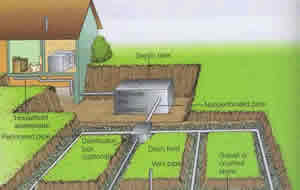
Figure 1 - Septic system
Septic systems are buried in the ground and are odorless when properly designed, installed and maintained.
A septic system is made up of two primary parts.
- The septic tank
- A Leach Field
Your septic system does not require a lot of maintenance. If the septic tank was correctly designed, installed and is properly maintained it should last for the life of the home. The leach field, which is made up of a group of sewage drainpipes usually has a life of 20 to 25 years, again if properly designed, installed and maintained.
Maintaining Your Septic System:
To have a septic system that is reasonably problem free and will give you the longest life there are five simple rules that you should follow:
The basic key to a problem free septic system is to be conscious of what you put into the system. Taking place inside the septic system tank you have a decomposition of solids. If you are not careful about what you put into the system you can easily upset the delicate biological balance within the tank.
- You might think that adding water to your septic system would be a good thing. However, this is not the case. Excessive amounts of water can easily through-off the biological balance that allows the solid waste to be broken down.
- Basic liquid household chemicals such as laundry and dishwashing detergents, floor cleaners and other home cleaning products in normal and diluted quantities will not upset the actions within the septic tank. However, dumping left over paint, mineral spirits, turpentine, spoiled insecticides and large amounts of ammonia or chlorine bleaches directly into the septic system, can definitely have a negative effect on the biological process taking place in the septic tank.
- A homeowner that is operating a septic system must also be careful of the solids that enter the septic system. Solids that will not decompose or do not decompose easily should not be allowed to enter the septic system. These include:
- Grease should never be disposed of by pouring it down a drain especially if your home is equipped with a septic system. Grease sticks to the inside of drain lines and goes from a liquid state to a solid state very quickly. Pouring grease in drain systems is one of the biggest causes of stopped drains.
Coffee grounds
Disposable diapers
Facial tissues
Fabric dryer sheets
Cigarette butts
Heavy–duty paper towels
Sanitary napkins
Latex gloves and condoms
Tampons
Earth (from flower pots)
Cat litter
Panty liners
Note: Many of today’s extra strength toilet tissues are not septic system friendly. Septic systems require a toilet tissue that easily deteriorates when wet. There is an easy method that you can use to check your brand of toilet tissue. Place a handful of your toilet tissue into a jar that is half filled with water. Shake the jar. If the toilet tissue stays intact and does not break-up you are using an unfriendly septic system toilet tissue and should consider switching to another brand.
Note: Under sink waste disposers will increase the solid waste load on septic systems and because of this the septic tank may have to be pumped out more often.
No matter how efficiently your septic system is working a certain amount of solid waste will remain in the septic tank. This solid waste must be pumped out on a regular basis, usually every one to three years. There is no specific period of time because each septic system and the amount of waste being deposited it differs from home to home and family to family. If you are experiencing foul odors coming from your drains and slow draining from sinks and toilets it is definitely time to have your septic tank pumped out.
Note: Septic tanks located in northern climates are not as efficient, due to the fact that the cold temperatures slowdown the bacteria from decomposing the solid waste matter, as those located in southern climates and hence will need to be pumped out more often.
Note: Pumping out septic tanks is not a project for the homeowner. It requires a specially designed pumping truck and some expertise to do the job properly.
Out-of-Site, Out-of-Mind:
A common problem related to septic systems is that because they are not visible they can be easily forgotten when doing other home improvements, adding additions or landscaping property.
It is important for the efficient operation of your septic system that large amounts of water that may be collected on roofs and/or landscaping, driveway and patio runoff be directed away from the septic tank and the septic tank leach field.
